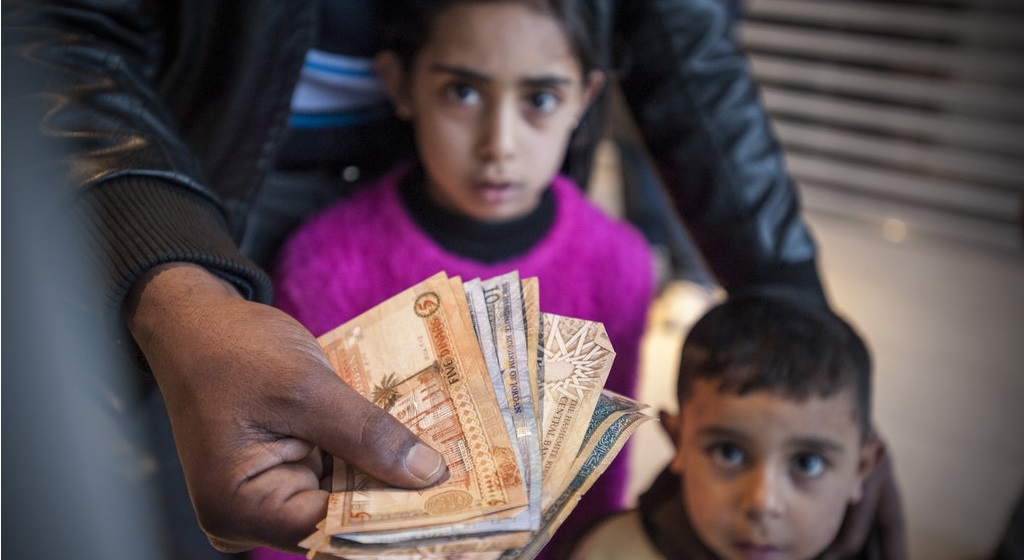Every month, 23,000 Syrian refugee families living in Jordan look forward to receiving the same text message. It’s a simple message, no more than a few words, but it’s what alerts them to their monthly financial assistance reaching their bank accounts. Since June 2012, UNHCR has been providing Syrian refugees in need of assistance in Jordan with an average of US$127 a month. The sum is modest, but its effect is considerable, because in the life of a refugee, small acts of normalcy, like withdrawing money from the bank, can go a long way toward reinforcing their sense of dignity.
Syrians first began entering the small Hashemite kingdom in 2011. Most settled in urban areas, amongst locals. Even today, only approximately 20 percent of Syrian refugees live in discrete refugee camps, where goods are regularly distributed. Many of the remaining 80 percent, living in urban areas, rely on cash assistance to be able to cover their basic needs. UNHCR does not have enough funds to provide every refugee with cash assistance. The agency thus needs to determine who is most in need through an assessment process. Once approved for cash assistance, refugees have a bank account opened for them from which they can independently withdraw their funds.

Hamidi picks up his family’s UNHCR monthly cash assistance at the bank. As of May 2016, Jordan hosts more than 650,000 registered Syrian refugees, of whom the vast majority live in urban areas. UNHCR’s monthly assistance programme uses fraud-proof iris-scan technology to distribute cash funds through special ATM machines, without the need for a bankcard or PIN code.
Initially, when UNHCR began its cash assistance program in 2008, it was distributing money to Iraqi refugees, who received bankcards and PIN numbers to make their withdrawals. But too often cards were lost or PINs forgotten, and sometimes refugees would also give their card to another family when they moved. To overcome these difficulties, UNHCR decided to employ biometrics for the cash assistance project. Cairo Amman Bank, UNHCR’s partner for its cash assistance program, already had iris-enabled ATMs. The new system of making cash withdrawals could therefore be rolled-out quickly, so that by the end of 2012, the iris scanning cash assistance program was up and running.
“Now we have 100 percent certainty that the money reaches those it was intended for. And we can see this not just at one point in time, but across the entire duration of the assistance”, says Heba Azazieh, a UNHCR officer who helped implement the biometric cash assistance project. Azazieh adds that it was important to find a way to improve the cash assistance program and avoid abuse, because it is one of the most efficient ways of getting aid to refugees.
“Cash assistance has by far the lowest overhead. Only two percent of available funds go towards banking fees. The remaining 98 percent go straight to the refugees.”
But the most important advantage of the cash assistance program, is how it makes refugees feel. Nobody needs to be told that being a refugee is difficult. For many, the status is associated with a degree of shame, and standing in line to collect allocated goods, like linen or food, can feel stigmatizing. The cash assistance program allows Syrian refugees in Jordan to avoid these cues. And cueing in front of an ATM machine, they become indistinguishable from the crowd. This, as well as the freedom to decide how to spend their resources reinforces their sense of dignity. Indeed, over 90 percent of those enrolled in the cash assistance program say that the iris enabled ATMs are a good way of withdrawing money. At the moment, UNHCR reaches two thirds of families in need of assistance. Heba Azaizeh says that if funds are continued, the agency aims to have at least 30,000 families receiving cash assistance by December, 2015. “That escalation is made possible by the new technology UNHCR Jordan employs, which meets the satisfaction of the refugees and the trust of donors,” says Azaizeh.
Photo Credit: © UNHCR/Sebastian Rich
We’re always looking for great stories, ideas, and opinions on innovations that are led by or create impact for refugees. If you have one to share with us send us an email at [email protected]
If you’d like to repost this article on your website, please see our reposting policy.

